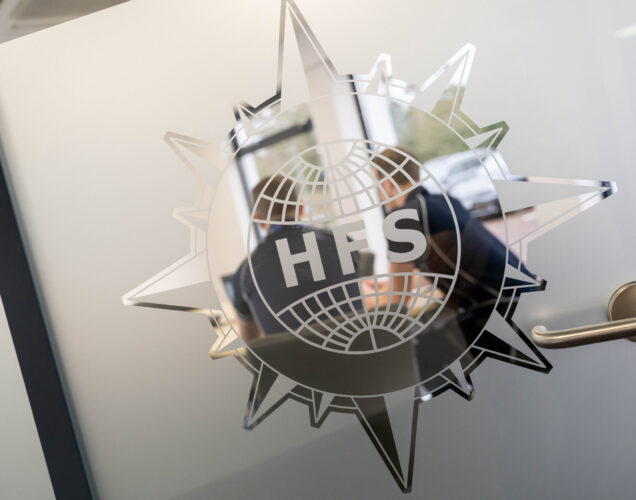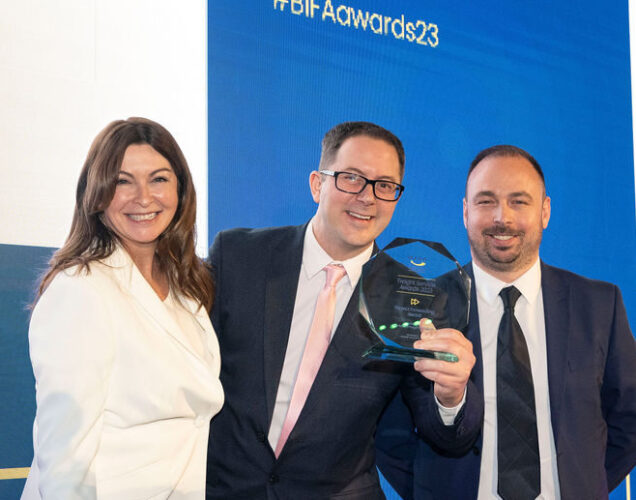Key milestones at Hemisphere are always a good opportunity to reflect on where we are now, how far we’ve come and the depth of experience in our team. With two key members of our Air Freight department celebrating 20 years with Hemisphere this year, you know your shipments will be in safe hands, getting to where they need to be in the best possible time.
We asked Mark Billany (Air Freight General Manager) and Matthew Evans (Air Exports specialist) for their thoughts on the changes, challenges and highlights of the last 20 years at Hemisphere.
Firstly, congratulations on 20 years at Hemisphere! What drew you to working in Air Freight, and at HFS?
Matthew:
I’d just come out of a cabling job at the time in February 2002, and wanted a more desk-based role. Andy Jordan (Specialist Services Manager) had been a family friend for years – he said there was a position in Air Freight coming up and I should apply for it. After around 18 months, I gave exports a try, and very quickly became the supervisor’s right hand man. 20 years later and here we are!
Mark:
At the start of my career, I worked in marketing and I was pretty young at the time when I started looking at logistics. I joined a small, family-run firm as a supervisor, got stuck in and soon progressed to a manager role. I worked at several companies before settling at Hemisphere 20 years ago. It all worked out nicely in the end.
What do you both love about Air Freight?
Matthew:
Personally, I like that aspect of sending things all over the globe, working out the logistics on trade lanes to and from the UK, Europe, the USA, China, the Middle East, Australia, South America… the list goes on. We’ve sent some interesting things over the years, too, like the Bugatti Veyron and several items related to celebrities. My geography knowledge has got a lot better too!
The last couple of years have been tough, but generally I’ve always really enjoyed the job. Hence staying for so long – it’s by far the longest career path I’ve had, and I wouldn’t have been here for 20 years if I didn’t enjoy it as much as I did.
Mark:
There’s one track to what we do, but it’s always changing and that variety makes it interesting. What I also like are the things I know about the most – the multi-tasking, the running around, dealing with airline schedules, making sure cargo doesn’t spend too long in storage and so on, which is especially important with all the ecommerce logistics we’re doing. It’s nice to have that pressure. It’s the sort of thing you hate but would miss if it wasn’t there. I tend to thrive on it.
How would you say Air Freight has changed over the last 20 years?
Mark:
Massively, really. The computer systems have all evolved and changed. The authorisations – what you can and can’t do – have changed. In essence, it’s still the same job, but technology has changed the level of detail.
In terms of customs systems, it’s a lot easier than it was. But in terms of red tape and bureaucracy, it’s now a lot harder. Obviously Brexit hasn’t helped that. Computers have made things more slick, but everything around the job is more complicated, in a nutshell.
The pandemic caused a huge spike in ecommerce with people ordering far more online and getting it delivered at home. We’ve had to orchestrate a huge change in our fulfilment process and warehousing. So I’d say that a big change in buying habits has caused big changes in our business.
Matthew:
I would say the documentation is easier, and some of the red tape is easier now thanks to technology. Back in the day, all the bookings and bills had to be done on typewriters and faxes to customs and so on… I’m glad I missed most of that era!
Obviously the pandemic changed a lot of things. The airlines had to delay and limit flights, but hopefully things will even out on that front now as we come out of it.
What makes you and Hemisphere successful in the Air Freight market?
Mark:
Probably the fact we can do a bit of everything, and have all the accreditations to do so. For example, the BIRDS licence for e-commerce, the ETSF customs bonded warehouse accreditation and full NCTS/CCG capability. This gives us the ability to create and discharge the all-important T1 transit documents, so non-EU goods can travel freely into the EU.
Matthew:
I think also, for both of us, it’s the vast experience over a long period of time. After 20 years, there’s not much I don’t know about exports, so people can come to me for advice or help. I’m always ready and willing to assist anyone else in the department if they need anything.
If we come across a new type of customs rule, we’ve got the NES help desk, ASM and various bodies we can contact to find out how to do a new type of entry if we had to. We’ve had that a few times, where a system’s changing and we’ve had to work through how to do things.
Mark:
As systems change, you apply your experience and common sense to work out how to get it done. We don’t need to go on courses, because we learn everything we need to right here on the front line. Working through it yourselves is the best way to achieve success.
What’s been your biggest challenge over the years?
Matthew:
We’ve had a few challenging shipments where we’ve had to go off-site to the airline premises for various reasons. One in particular that stands out was a time we had to personally label freight and witness the load with pictures for a consignment of high security exam papers. But it’s all just part and parcel of the job, really.
Mark:
Often it’s dealing with people who simply aren’t professional. People that won’t pick up the phone or answer your email, or who just generally don’t care as much as everyone else about cargo getting to where it needs to be. Unfortunately, you can’t have full control over airlines’ processes, schedules, and decisions, which can be frustrating when we are trying our utmost to keep our client’s products on track.
Matthew:
There’s always loads of challenges every day. In the end, dealing with challenges is a part of our job. One bigger challenge we rose to was getting aid packages from a particular customer out to Haiti after the earthquake disaster in 2010, which we managed to do in a timely manner.
Mark:
During the pandemic we had to handle the importing of a lot of PPE equipment, ironically from Wuhan in China. But the government had implemented a new licence system for declaring PPE on customs and we had to scramble to get everything declared properly. That was a big challenge at the time.
How have you overcome these challenges?
Mark:
Going back to what I mentioned earlier, getting all the accreditations in place as and when they come up. This means we’re fit to deal with pretty much everything, and luckily that’s what we’ve also got the experience to do. We’re forward-thinking and prepared for anything.
Matthew:
We’re fortunate enough to be in a position where we always hear about big changes to customs or other issues before they actually happen and get the wheels in motion. So we’re always generally ready for the challenges before they arrive.
What’s been your biggest achievement?
Matthew:
I designed a lot of the forms we all deal with across the departments – all the spreadsheets with formulas and so on. I’m quite proud of all the things I’ve done to improve our lives in the department. I’m always thinking of new ideas of what we could do to improve systems that we try, then discuss among ourselves and refine them.
There’s one particular FOB calculator that sends pre-alerts to agents. It works out all the charges you need to list out for an agent when you send them the cost – airport charges, terminal charges, pickup charges, etc. When you enter the type and volume weight, it works out if it’s chargeable according to the volume. That’s a particular point of pride for me.
Mark:
I’m proud to play a big role in our relationships with all the overseas agents – going to conferences and developing our networks is really important. And also maintaining our accreditations, especially on the ecommerce side. We’ve now got a dedicated department for this, which I spearheaded. It got us well ahead of Brexit when it happened and we hit the ground running. That’s quite an achievement in itself.
What’s the one biggest change you’ve seen at Hemisphere over the last 20 years?
Matthew:
The biggest change was Covid and Brexit happening in quick succession, and everything around that. It’s made the job more demanding in every way, especially with the road freight processes.
Mark:
The issue is not so much the changes caused by Brexit, but people’s inability to cope with them, or prepare for them. So it was up to us to work with businesses, to educate and support. That’s been the biggest change. The way we had to become leaders in this scenario.
In terms of Hemisphere itself, as it’s grown it’s had to adopt a more corporate approach and structure. And there’s been a big increase in marketing activity!
Matthew:
In terms of growth, when I started, the staff numbers must have been around 10% of what they are now. The biggest change really has been the massive growth of the company itself and all that entails.
What have you enjoyed the most in the last 20 years?
Matthew:
We have a great working environment. Quite a few of us are friends outside of work and we all keep each other cheerful with all the banter in the office. There’s such a good atmosphere, if you don’t enjoy coming to work and the people you’re working with, you wouldn’t do it.
Mark:
Yes, that’s the same for me as well. It’s a great environment here at Hemisphere. You don’t get this at most other companies.
What are you excited about for the future?
Matthew:
I’m looking forward to another 20 years and getting another 20-year bonus! <laughs> But really, I don’t know what’s around the corner. If the industry gets easier again as everyone gets used to new systems, then I’d be happy. I’m a recent family man with a 5-year-old boy, so I’m excited about spending time with him. I just hope the company continues to thrive and grow. That would keep my job safe and interesting for another 20 years.
Mark:
I’d be excited about us rejoining the European Union but, to be honest, I take each day as it comes. In our job, you don’t know what might happen so it’s difficult to plan too far ahead, or expect exciting changes. Best to focus on the present and doing a good job.
Want to join the team?
If you’re looking to advance your logistics career, or simply want to take your first step in the industry, check out our latest vacancies on LinkedIn. Alternatively, please feel free to send a CV to hr@hemisphere-freight.com.







